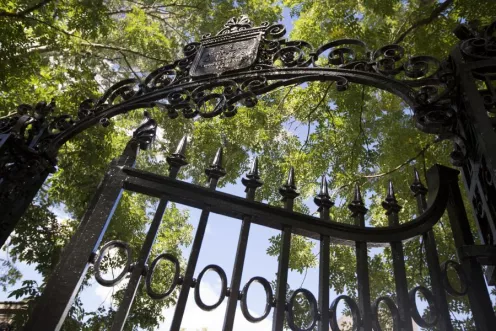Students play an integral role in the Berkman Klein Center’s mission to explore and understand cyberspace. Here are a number of pathways for Harvard students interested in getting involved with the Center and its community of staff, fellows, and faculty. To get updates, plus additional information about the Center’s research and activities, we encourage you to:
- Sign up for our Harvard Student Bulletin, over which we’ll share information about Research Assistant positions, as well as special Harvard student events and opportunities.
- Sign up for the Center's other public email lists, most notably the Buzz, which shares events, news, and other BKC activities. Follow the Center on X, Linkedin, and Instagram.
- Check out the Center’s projects for the 2025-2026 academic year and how you can get involved in this write-up from our student open house.
The list below includes examples of ways to get involved:
- Events: The Center hosts an extraordinary number of events, including student-driven events, throughout the academic year, most of which are open to the public. This includes a lunch speaker series, in which the Center brings in speakers and fosters discussions on interesting and thorny questions about technology and society. Events are announced via the above-referenced email lists, and are listed on the Berkman Klein website, where livestreams are also available for select public events.
- Research Assistant Opportunities: Staff researchers and Fellows at the Berkman Klein Center regularly work with student research assistants to support the Center’s docket of projects, and individual BKC faculty directors may also hire research assistants directly to support scholarship and other work. Students should monitor the "Research Assistantships" page on the BKC website and the HLS “Administrative Updates” page.
- BKC Programs: At the heart of the Berkman Klein Center are the individuals, institutions, and initiatives that bring people and ideas together. We host a number of institutional programs and network-building efforts that provide meaningful opportunities for students, faculty, practitioners, and members of the public to engage with us and with one another. Check out more of our student-facing programs:
- Student-Led Events and Partnerships: Recognizing that students are often at the forefront of innovative technology and AI use, BKC encourages students to share their expertise and lead conversations, enriching our community as both learners and teachers. You may propose and lead events, partner with BKC on workshops or speaker series, or collaborate with existing student organizations. Many successful initiatives—including Student Leaders in AI, the Student Salon Series, and co-hosted events with AISST (e.g., Safety Speaker Series), JOLT, and ReCompute—have started as student-led collaborations. If you are interested in proposing an idea or co-hosting an event, please submit your idea here.
- Technology / Tools: Although coding or other technical skills are generally not prerequisites for participation in most of the Berkman Klein Center’s activities, the Center welcomes contributions to and involvement in its suite of free and open source software projects on the BKC GitHub repository. Students and others can also use a number of tools the Berkman Klein Center has built for educational purposes, discourse, research, and design. Examples of tools include H2O “OpenCasebook” platform; the Digital Literacy Resource Platform; Media Cloud; and TagTeam.
- Engagement with BKC Fellows and Other Community Members. In addition to its staff and affiliated faculty, the Berkman Klein Center has fellows, affiliates and faculty associates who join the Center each year to further their own work and/or the work of the Center. Students are welcome to reach out directly to individual community members whose research aligns with their areas of interest. Information about the people at the Center may be found at https://cyber.harvard.edu/people.
If you have more questions or would like to connect, we regularly offer opportunities to visit the Center and meet staff, as well as virtual office hours on most Mondays from 2:00-3:00 pm ET. Please watch the Harvard Student Bulletin for upcoming opportunities or email studentengagement@cyber.harvard.edu to reserve time during virtual office hours.
